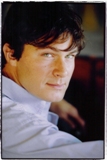The show was “West Side Story.”

I’d
call it “South Side Story,” too. South
of the river, up I-471 to Greaves Concert Hall at
That’s where the Kentucky Symphony Orchestra presented Leonard Bernstein’s path-breaking, "Romeo and Juliet"-inspired musical May 9 and 10. And with deference to Bernstein, the KSO led by music director James R. Cassidy and their collaborators from NKU and the Greater Cincinnati arts community were the story.
The semi-staged production was a remarkable accomplishment.
One wonders how they did it:
[] working on a 52 x 32-foot stage (kind of a trapezoid, actually)
[] with a 33-piece orchestra onstage in the back
[] with the orchestra separated from the action by mesh curtains with images of fire escapes and buildings projected onto them
[] leaving only two-thirds of the stage free for the singers and dancers.
However, they did it splendidly (this reviewer heard the May 10 show) and with limited resources -- at least materially speaking. (Sponsors the Eleanora C.U. Alms Trust Fund at Fifth Third Bank, Paula M. Steiner Family Foundation and Architectural Group International were acknowledged from the stage as well as in the program).
What the show had in spades was what mattered most: imagination, will and an abundance of talent.
Cassidy had to persuade the Bernstein Estate to let him perform “West Side Story” with the orchestra onstage. But "can-do" Cassidy has been pulling rabbits out of hats since he founded the KSO in 1992 and permission was granted.
A gratifying number of those rabbits were trained in Greater Cincinnati, either at NKU or the
With a supporting cast from CCM and NKU and
gang members and their girlfriends made up entirely of NKU students, the
streets of
The production staff included stage director Gina Kleesattel, a teacher at Cincinnati’s School for Creative and Performing Arts; lighting and sound designer Terry Powell of the NKU faculty; choreographer/NKU graduate Liz Vosmeier; free lance stage manager Jennifer Claudy; and combat choreographer Melissa Bennett, who is theater facility manager for SCPA.
Cassidy led the bracing, finger-snapping overture under blue lights, setting the scene for the glandular "Jet Song" led by rising star Matt Bohnert (NKU sophomore) as Riff. Then it was Bogart's turn with a mellow, swoony "Something's Coming."
The Dance at the Gym (“Mambo”) was zestfully
done, with the gangs menacing each other and Bogart and Devlin quietly
discovering each other amid the commotion. Being up close in 650-seat Greaves
(sold out Saturday and nearly so for Friday's opening) drew one into the action,
and every word, sung or spoken, was cleanly accented and could be clearly
understood.
The Balcony Scene (“Tonight”) exemplified young love, and Tony and Maria’s fluttery, giddy farewell pulsed with newly awakened passion.
CCM alumna Gabrielle Stravelli made sparks
as Bernardo's girlfriend Anita, leading "
The lyrics were hardened a bit for the show (racial epithets flew mercilessly and "mother-loving" replaced "ever-loving" in the "Jet Song"). Critical mass was easily met for the climactic Rumble where Bennett's combat choreography was lightening quick and frighteningly realistic.
The scene in the bridal shop (“One Hand One Heart”) where Tony and Maria exchange vows was tender and achingly beautiful. In a nice touch of orchestration, a siren sounded against the violin solo in the ballet sequence "Somewhere." Stravelli and Devlin's heart-to-heart exchange, "A Boy Like That" and "I Have a Love," took place fittingly under red lights.
Devlin showed herself a compelling actress
in the finale, where she cradled the dying Tony, brandished
As the "adults," George Alexander (Officer Krupke), Dain Paige (Lt. Schrank/Glad Hand) and D.G. Roth (Doc) made fine contributions. Roth's Doc (Friar Lawrence in Shakespeare's "Romeo and Juliet") shone like a beacon amid the violence.
Cassidy and the KSO upheld their task neatly throughout the show, which made exceptional demands in terms of balances and ensemble unity. Bernstein's jazzy rhythms (Cassidy invited the crowd to shout "Mambo" at one point) and melodic sheen suffused the hall and there were no glitches, save for a malfunctioning spotlight at the beginning of Saturday's performance.
Cassidy and the KSO have shown the area what can be done with vision, heart and management that is realistic, but does not shy away from risk-taking. Call it letting your reach always exceed (what you think is) your grasp.
"West Side Story" closed the KSO's 2007-08 season. Programming for 2008-09 is yet to be announced, but will include Andrew Lloyd Webber's "Phantom of the Opera."